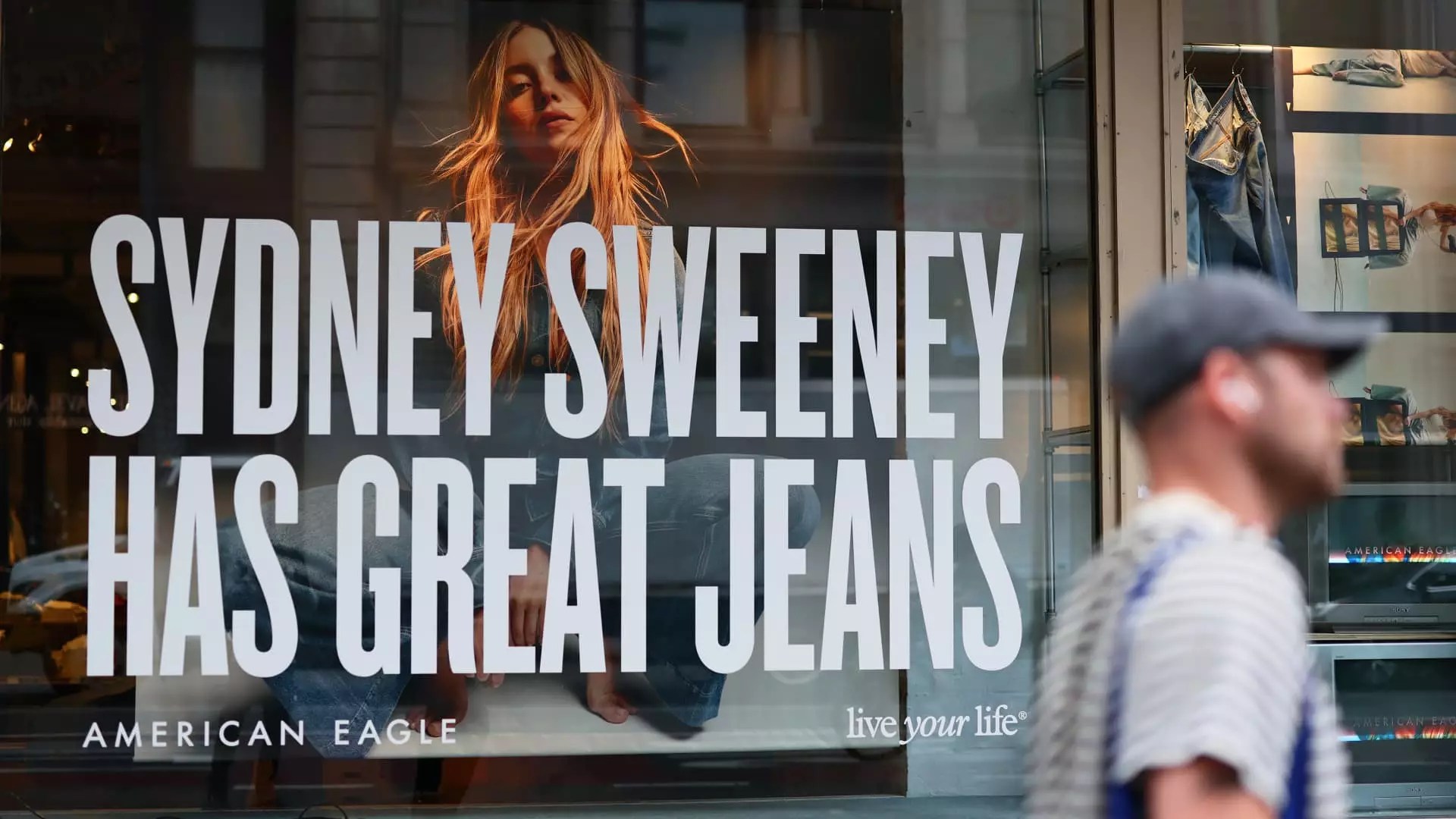In a landscape where consumer loyalty shifts as swiftly as the political winds, American Eagle’s recent marketing stunt offers a clear illustration of how retail brands navigate cultural terrains. Their decision to align a campaign featuring Sydney Sweeney with the controversial and unpredictable world of social media had the potential to backfire spectacularly. Yet, amidst the criticism, an unlikely catalyst emerged—former President Donald Trump’s endorsement. His public praise didn’t merely give a fleeting boost; it reignited public and investor interest, underlining how deeply politics can influence commercial fortunes. This isn’t simply a matter of a catchy slogan or provocative imagery; it’s a calculated play on cultural divides, recognizing that in today’s polarized environment, any political figure’s tacit approval can swing perceptions in favor or against a brand.
This strategic gamble demonstrates a broader truth: in a center-right liberal climate, aligning a marketing campaign with traditional values or figures admired by conservative audiences can be a masterstroke. While mainstream brands often shy away from explicit political associations to avoid alienating potential customers, American Eagle’s move exemplifies a daring stance—asserting identity and values that resonate with a specific demographic without explicitly politicizing the product. Such moves, however, are fraught with peril, as backlash from critics on the left can be swift and intense, often catalyzing stock volatility and consumer ambiguity. Yet, in this case, the right-leaning endorsement acted as a booster shot, illustrating the potent role political narratives play in consumer markets.
The Cultural Divide and the Power of Norms
The backlash against the campaign reveals much about shifting cultural norms. Critics accused the ad of sexual innuendo and outdated marketing conventions that no longer align with evolving societal expectations. American Eagle’s attempt to project confidence, youthfulness, and a straightforward message about jeans clashed with cultural sensitivities, which increasingly scrutinize advertising for sexualization and inclusivity. The slogan “Sydney Sweeney has great jeans” was perceived by some as a veiled commentary on her appearance or genetics, fueling debates about objectification and the exploitation of female celebrity imagery.
From a political lens, this controversy typifies the delicate balancing act brands must perform in an era hyper-aware of gender and racial politics. The company’s response—to insist that the slogan was about the product—reflects a defensive posture, but the damage had already been done. This dynamic underscores a broader ideological divide: while the cultural left pushes for progressive representation and challenging traditional marketing norms, the right often retails a nostalgic or classic ideal of straightforwardness and traditional presentation. American Eagle’s campaign inadvertently became a cultural battleground, with marketing innovation on one side and social critique on the other.
Market Realities and the Fluctuating Financial Landscape
The political and cultural skirmishes around the campaign aren’t occurring in a vacuum—they are directly tied to American Eagle’s economic realities. The retailer has been grappling with declining sales, macroeconomic headwinds, and missteps in merchandising. The market’s reaction to the campaign underscores a harsh truth: consumer attention is a finite, highly competitive resource. Brands that fail to adapt risk being left behind, while those daring to step into controversial territory may find themselves temporarily boosted or permanently damaged.
American Eagle’s stock performance illustrates this tenuous calculus. Despite a surge on the day Trump’s endorsement went viral, the overall year has seen the company struggle with a 27% drop, exacerbated by broader economic challenges including tariffs and shifting consumer preferences. Yet, the spike in Google search interest indicates that even short-term visibility—amplified through political associations—can translate into heightened brand awareness. Whether this awareness fosters deeper loyalty or fades with the next controversy remains uncertain; still, it exemplifies how political endorsements and cultural signals can influence market perceptions almost instantaneously.
Controversy as a Double-Edged Sword
The American Eagle saga exemplifies the risky dance brands perform when they choose to engage with cultural politics rather than remain neutral. While their initial marketing faced pushback, the subsequent support from a figure like Trump added a layer of validation, particularly to conservative segments. It’s a testament to how polarization creates space for brands to differentiate themselves, appealing explicitly to one demographic at the expense of alienating another.
In a broader sense, the campaign’s mixed reception underscores a vital truth: in the cultural marketplace, controversy can be a strategic asset or a destructive force. This duality requires brands to play their cards carefully, understanding that what appeals to one side of the political spectrum may trigger a backlash from the other. In the end, American Eagle’s willingness to stake its claim in this contentious arena reflects a broader trend within center-right liberalism—an acknowledgment that appealing to traditional values and cultural conservatism can be a legitimate, if risky, route to market differentiation.
The real question remains whether this approach will yield long-term benefits or merely serve as a fleeting moment of notoriety, with the brand’s future riding on the evolving political currents.

